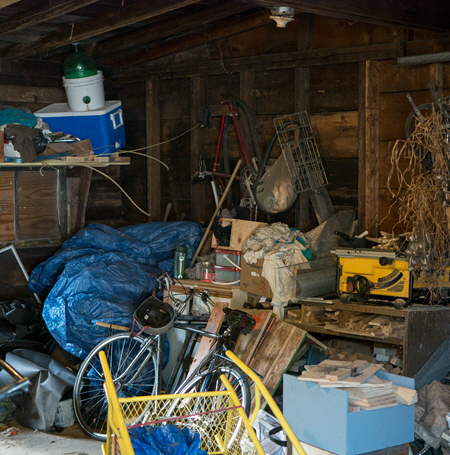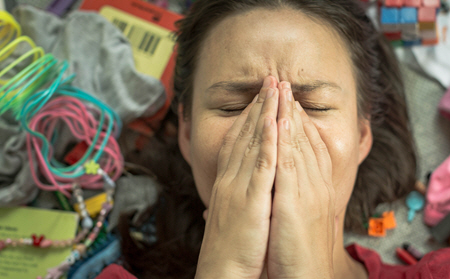 These are the toughest cases you’ve encountered.
These are the toughest cases you’ve encountered.
You want your clients to live in a safe and healthy home – to make sure they stay housed.
But hoarding is making those goals nearly impossible, and the clutter is exerting a significant effect on your clients’ daily functioning.
What’s more, most of these clients are resistant to your help. They might not even let you in the front door – or perhaps, they can’t open the front door – because of the clutter.
Isolated, depressed, they’ve made promise after promise to get things cleaned up – but are embarrassed by their repeated failures to do so.
You can see how much they’re hurting – yet it still doesn’t appear they truly understand the severity of the problem.
You’re not the only one who’s concerned.
To complicate matters further, the neighbors complain, and their landlord is threatening eviction.
Their family won’t talk to them anymore.
Animal Control is involved, and Code Enforcement has cited the home. Legal action is pending.
Everyone wants to help, but nothing seems to work.
You’ve given it your all.
Maybe they’ve even allowed you to clean up their space. But in a matter of months, the clutter came back – with a vengeance.
You’ve tried numerous carrots and several sticks. Perhaps we should hire a professional organizer? Maybe let’s give them a deadline? Would medication work?
 Nothing seems to motivate them.
Nothing seems to motivate them.
You’ve put so much time and energy into your client – they realize how badly you want to help.
But you’ve hit a dead end.
You’ve tried everything – there’s nothing left to do. It feels hopeless.
And you’re not alone. Most service professionals encountering Hoarding Disorder, or HD, feel pretty frustrated and unequipped to manage these cases.
Why is Hoarding Disorder so challenging?
There are many reasons for this.
Primarily, people with HD often resist getting help and may lack insight into how severe their hoarding issue truly is. It’s rare to find someone with HD reaching out for help – those are the unicorns.
More than likely, you’re getting calls from frustrated family members, irate landlords, or local government services, like the fire department or animal control, who have simply reached their wit’s end with the situation.
Also, HD is more widespread than people realize. Recent research indicates that about 5% of the population has HD, making it the second most prevalent mental illness after depression!
Another tricky aspect of treating HD is that it all comes down to brain wiring. The brain of someone who has HD is simply wired differently than that of a non-HD person. Decision-making and organizational challenges, clutter blindness, and avoidance behaviors are all hallmarks of this wiring.
 This is where I come in.
This is where I come in.
I have over ten years of experience working with the HD population. Using the latest research, I’ve developed strategies and tools to help you manage your HD clients.
There’s no quick fix or magic pill here, but I can promise you a roadmap of results-oriented interventions designed to increase your clients’ health and safety in the home and improve their overall functioning.
A Little About Me
From researching accounts of famous hoarding situations to watching almost every episode of Hoarders, HD has always fascinated me, so much so that I made hoarding the subject of my doctoral project.
At the time, HD wasn’t even an official diagnosis in the DSM, and there wasn’t a great deal of research on the subject. In the end, I added to the body of literature: “Hoarding: Symptoms, Diagnosis, & Treatment.”
Since graduating and getting licensed, I’ve worked with numerous HD clients, run several HD groups, and have consulted for and trained hundreds of service professionals. I regularly train and consult for the LA Department of Health Services Housing for Health division and the LA County Department of Mental Health.
In 2016, a permanent supportive housing organization asked me to design and run a hoarding management program. This turned into a practicum program for graduate psychology students. I trained and supervised these students to provide therapy to residents at risk of eviction and whose health and safety were affected by the clutter.
Although the program had to close in 2020 because of funding issues, I’m proud to say that not one of our clients was evicted because of hoarding while we were there.
What I Offer
Every agency and service professional’s needs are different. I customize my services to your unique situation.
Training – my training sessions cover a variety of topics, including the fundamentals of what HD is (symptoms, diagnosis, neurological and genetic factors, family and community effects), as well as assessment, a treatment toolbox for clients, motivated to engage in the treatment, and harm reduction strategies for helping more reluctant clients.
 Case consultations – sometimes, all you need is a brief check-in about handling a particular case. I can guide you on conceptualizing what’s happening, ideas for interventions, and resources for additional help.
Case consultations – sometimes, all you need is a brief check-in about handling a particular case. I can guide you on conceptualizing what’s happening, ideas for interventions, and resources for additional help.
On-going workgroups – For larger agencies dealing with multiple hoarding cases, a regular opportunity to check-in is often helpful. We schedule these workgroups regularly (usually weekly or monthly) and provide optional drop-ins for therapists, case managers, or any other service provider needing additional assistance with an HD case. These are not intended to be formal trainings – but a time for service providers to share their cases and brainstorm together.
It’s time to feel more empowered to help your clients!
I have a toolbox full of answers, but I will not hoard them!
Call me now at (818) 861-6463. I look forward to sharing all I’ve learned with you!
Dr. Schlichter is a pleasure to work with. She is approachable, communicative, flexible, and was able to customize specific trainings and workshops to fit the needs of our staff and agency. Her presentations are engaging, easy to follow, and provide practical interventions for staff to apply in the field when working with Hoarding Disorder. Our staff gave unanimous positive feedback regarding her presentation style, materials, and content!
Rachael Radis, L.C.S.W.
Director of Staff Development | Step Up on Second
I have had the pleasure of attending Dr. Dani’s trainings and consulting with her on hoarding interventions for over 3 years. She is great at offering practical and tailored interventions to address the unique needs of the client(s). Her teaching background makes her trainings easy to follow and her perspective on the material is very interesting and engaging.
Jose-Antonio Aguilar, PsyD
Housing For Health Program Manager at Los Angeles County Department of Health Services
I am a professional organizer, and many of my clients are diagnosed with a hoarding disorder. Fortunately for my clients, I know Dr. Dani and love to refer her good work. She has a deep knowledge of the disorder and has an uncanny ability to make the nuances of hoarding easy to understand. Dr. Dani provides practical applications of the content to use in real life situations with clients. She is professional, but down to earth, has a great sense of humor, and is a caring and compassionate mental health professional.
Regina F. Lark, Ph.D, CPO-CD
A Clear Path, LLC
Dr. Schlichter is such a pleasure to work with. Her trainings provide practical interventions for staff to apply in the field when working with Hoarding Disorder and generally difficult to work with clients. Dr. Schlichter has always proven to be a fantastic guiding clinical voice to seek the most positive outcome when addressing difficult cases. I highly recommend anyone to work with her when thinking about addressing issues of Hoarding or if more clinical insight or guidance is needed for your agency.
Jack Lahey, MSW
Sr. Director of Housing Stabilization | LA Family Housing
Dani is a great trainer! She is easy to work with, flexible and accommodating in creating a custom training for our providers.
She is extremely knowledgeable about hoarding and offers great practical strategies to help case managers learn how to work with clients around this disorder.
She’s personable, approachable and a terrific teacher! We have received fantastic feedback from our providers on her teaching approach and style.
Connie W. Mitchell, MSW
Associate Director, Permanent Supportive Housing
Housing For Health, Los Angeles County Department of Health Services

